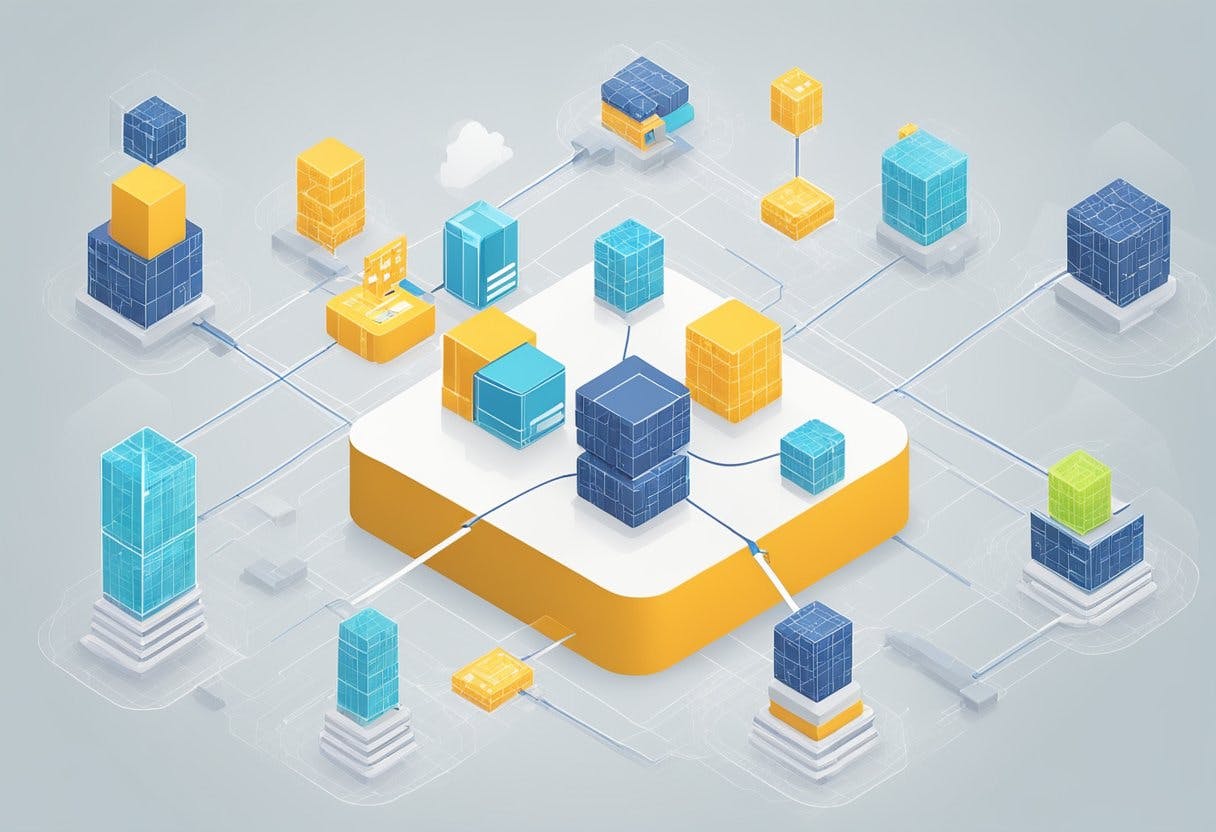
Blockchain technology has been making waves in various industries, and one of the most promising areas where it is being used is in supply chain management. Blockchain has the potential to revolutionize the way supply chains operate, from enhancing transparency and traceability to improving security and trust in transactions. With the help of blockchain, supply chains can become more efficient and cost-effective, while also reducing the risk of fraud and errors.

One of the key benefits of blockchain in supply chain management is the ability to enhance transparency and traceability. By using blockchain, companies can create a secure and tamper-proof ledger of all transactions, which can be accessed by all parties involved in the supply chain. This can help to reduce the risk of fraud and errors, as well as improve the accuracy of supply chain data. Additionally, blockchain can help to improve supply chain traceability, making it easier to track products from their origin to their final destination.
Another benefit of blockchain in supply chain management is improved security and trust in transactions. Blockchain technology uses advanced encryption and security protocols to ensure that all transactions are secure and tamper-proof. This can help to reduce the risk of fraud and errors, as well as improve the overall security of the supply chain. Additionally, blockchain can help to improve trust between parties involved in the supply chain, making it easier to conduct business and build strong relationships.
Key Takeaways
- Blockchain technology has the potential to revolutionize supply chain management by enhancing transparency and traceability, improving security and trust in transactions, and making supply chains more efficient and cost-effective.
- By using blockchain, companies can create a secure and tamper-proof ledger of all transactions, which can help to reduce the risk of fraud and errors, as well as improve the accuracy of supply chain data.
- Blockchain technology uses advanced encryption and security protocols to ensure that all transactions are secure and tamper-proof, which can help to reduce the risk of fraud and errors, as well as improve the overall security of the supply chain.
The Basics of Blockchain in Supply Chain Management

Understanding Blockchain Technology
Blockchain technology is a decentralized, distributed ledger that records transactions in a secure and transparent manner. In a supply chain context, blockchain can be used to create a tamper-proof record of all transactions, from the sourcing of raw materials to the delivery of finished goods. This can help to improve transparency and accountability, reduce fraud and errors, and increase efficiency.
The key features of blockchain technology that make it well-suited for supply chain management include its ability to create a secure, tamper-proof record of all transactions, its decentralized nature, and its ability to provide real-time visibility into the status of goods as they move through the supply chain.
Key Advantages for Supply Chains
There are several key advantages that blockchain technology can offer supply chains. These include:
- Increased transparency and accountability: Blockchain technology can create a tamper-proof record of all transactions, which can help to improve transparency and accountability in the supply chain. This can be particularly important for companies that are looking to improve their sustainability and ethical practices, as it can help to ensure that all suppliers are adhering to the same standards.
- Reduced fraud and errors: Because blockchain technology creates a secure, tamper-proof record of all transactions, it can help to reduce the risk of fraud and errors in the supply chain. This can help to improve the accuracy of inventory records, reduce the risk of counterfeit goods, and improve the overall efficiency of the supply chain.
- Increased efficiency: Blockchain technology can help to increase the efficiency of the supply chain by providing real-time visibility into the status of goods as they move through the supply chain. This can help to reduce the time and cost associated with manual tracking and reconciliation, and can help to ensure that goods are delivered on time and in the correct quantity.
Overall, blockchain technology has the potential to revolutionize supply chain management by improving transparency, reducing fraud and errors, and increasing efficiency. As the technology continues to evolve and mature, it is likely that we will see more and more companies adopting blockchain-based solutions to improve their supply chain operations.
Enhancing Transparency and Traceability

One of the key benefits of blockchain technology in supply chain management is its ability to enhance transparency and traceability. Through its transparent and immutable ledger, blockchain provides real-time visibility into supply chain operations, improves traceability, streamlines procurement processes, fosters trust, and enhances authenticity and provenance.
Improving Visibility Across the Supply Chain
Blockchain technology provides a tamper-proof and secure way to track products and transactions across the supply chain. This enables all authorized participants in a supply chain to gain access to one version of the truth, which improves transparency and visibility. Suppliers, manufacturers, distributors, retailers, and consumers can get real-time updates about goods’ status and location in real-time, which helps to reduce the lack of transparency that often plagues supply chain management.
Blockchain and the Internet of Things (IoT)
The integration of blockchain technology with the Internet of Things (IoT) has the potential to revolutionize supply chain management even further. IoT devices can collect and transmit data about products, such as temperature, humidity, and location, which can be recorded on the blockchain. This provides an additional layer of transparency and traceability, making it easier to track products and ensure their authenticity and provenance.
In summary, blockchain technology is revolutionizing supply chain management by enhancing transparency, traceability, and visibility. By providing a tamper-proof and secure way to track products and transactions across the supply chain, blockchain is improving the authenticity and provenance of products, streamlining procurement processes, and fostering trust between all participants in the supply chain.
Security and Trust in Transactions

Blockchain technology has brought about a paradigm shift in supply chain management by ensuring secure and transparent transactions. It has become a vital tool in supply chain management as it offers a decentralized ledger that provides immutable records of transactions. This section will discuss how blockchain is revolutionizing the supply chain management industry by providing security and trust in transactions.
Preventing Fraud and Errors
One of the most significant advantages of blockchain technology is its ability to prevent fraud and errors. Blockchain provides an immutable record of transactions, which makes it almost impossible to tamper with. This is because the data is stored in a decentralized ledger, which means that there is no central point of control that can be hacked or manipulated. As a result, blockchain technology provides a secure and transparent way of conducting transactions, which ensures that fraud and errors are minimized.
Smart Contracts for Secure Exchanges
Blockchain technology also provides an innovative solution to secure exchanges using smart contracts. Smart contracts are self-executing contracts that are programmed to execute automatically when certain conditions are met. They operate on the blockchain, which ensures that they are secure and transparent. Smart contracts eliminate the need for intermediaries, which results in faster transactions, lower costs, and increased security.
By using smart contracts, supply chain managers can create a secure and transparent system that eliminates the need for intermediaries. This ensures that the exchange of goods and services is conducted in a secure and transparent manner, which increases trust between the parties involved. Additionally, smart contracts can be used to automate the payment process, which reduces the risk of fraud and errors.
In conclusion, blockchain technology is revolutionizing the supply chain management industry by providing security and trust in transactions. It provides a decentralized ledger that ensures immutable records of transactions, which makes it almost impossible to tamper with. Additionally, smart contracts provide an innovative solution for secure exchanges, which eliminates the need for intermediaries and ensures faster transactions, lower costs, and increased security.
Operational Efficiency and Cost Savings
Blockchain technology has the potential to revolutionize supply chain management by enhancing operational efficiency and reducing costs. It can streamline supply chain processes, reduce delays, and minimize waste, leading to improved performance and better inventory management.
Streamlining Supply Chain Processes
One of the key benefits of blockchain technology is its ability to streamline supply chain processes. By providing a secure, decentralized platform for tracking and verifying transactions, blockchain can reduce the need for intermediaries, such as brokers and banks. This can lead to faster transactions, fewer errors, and lower costs.
Blockchain can also provide greater transparency and traceability across the supply chain, allowing companies to track products from the point of origin to the point of sale. This can help companies identify inefficiencies and bottlenecks in their supply chain, allowing them to make improvements that can further streamline their operations.
Reducing Delays and Waste
Another benefit of blockchain technology is its ability to reduce delays and waste in the supply chain. By providing real-time visibility into inventory levels, shipments, and other key metrics, blockchain can help companies make more informed decisions about when and where to allocate resources.
This can help companies reduce waste by ensuring that they have the right inventory in the right place at the right time. It can also help companies reduce delays by improving logistics planning and reducing the risk of supply chain disruptions.
Overall, the use of blockchain technology in supply chain management has the potential to improve operational efficiency and reduce costs. By streamlining supply chain processes and reducing delays and waste, companies can improve their performance and better manage their inventory.
Challenges and Future Outlook
Overcoming Scalability and Interoperability Issues
One of the biggest challenges in implementing blockchain in supply chain management is the issue of scalability. As blockchain is a distributed ledger technology, it requires a large number of nodes to validate transactions. However, as the number of nodes increases, the time taken to validate transactions also increases, leading to scalability issues.
Interoperability is another challenge that needs to be addressed. Different blockchain platforms use different protocols, which makes it difficult to integrate them with each other. This can lead to silos of information, which defeats the purpose of using blockchain for supply chain management.
To overcome these challenges, companies need to work together to develop common standards and protocols for blockchain. This will help ensure interoperability and scalability, making it easier for companies to adopt blockchain for supply chain management.
Emerging Trends in Blockchain for Supply Chain
Blockchain is still a relatively new technology, and there are many emerging trends that are likely to shape its future in supply chain management. One of these trends is the use of smart contracts, which can automate many of the processes involved in supply chain management, such as payments and quality control.
Another trend is the use of blockchain for traceability and provenance. By using blockchain, companies can track the movement of goods throughout the supply chain, from raw materials to finished products. This can help improve transparency and reduce the risk of fraud.
In the future, we can expect to see more real-world applications of blockchain in supply chain management. As companies become more familiar with the technology and its capabilities, we are likely to see more innovative use cases emerge. However, it is important to note that blockchain is not a silver bullet solution for all supply chain management problems, and companies need to carefully consider its benefits and limitations before adopting it.
Frequently Asked Questions
What are the key benefits of integrating blockchain into supply chain processes?
Integrating blockchain into supply chain processes offers several key benefits, including increased transparency, traceability, and security. Blockchain technology provides a decentralized, tamper-proof record of all transactions that occur in the supply chain, making it easier to track and verify the movement of goods and assets. This increased transparency and traceability can help businesses identify inefficiencies and reduce costs. Additionally, blockchain’s secure and immutable nature can help reduce the risk of fraud and cyberattacks in supply chain management.
In what ways does blockchain enhance transparency and traceability in supply chains?
Blockchain enhances transparency and traceability in supply chains by providing a secure and decentralized record of all transactions. Each transaction is recorded on a block, which is then added to a chain of blocks (hence the name “blockchain”). Once a block is added to the chain, it cannot be altered or deleted, creating an immutable record of all transactions. This makes it easier to track the movement of goods and assets throughout the supply chain, and to verify the authenticity of products.
How does blockchain technology improve security and reduce fraud in supply chain management?
Blockchain technology improves security and reduces fraud in supply chain management by providing a tamper-proof record of all transactions. Each transaction is verified and recorded by multiple nodes in the blockchain network, making it virtually impossible for any one person or entity to alter the record. This helps reduce the risk of fraud and cyberattacks, as well as increasing the overall security of the supply chain.
Can blockchain solutions be scaled to meet the needs of large, complex supply chains?
Yes, blockchain solutions can be scaled to meet the needs of large, complex supply chains. Blockchain technology is highly scalable, and can be used to track and verify transactions across multiple parties and locations. However, implementing blockchain solutions in large, complex supply chains can be challenging, and requires careful planning and coordination between all parties involved.
How does the implementation of blockchain impact the speed and efficiency of supply chain operations?
The implementation of blockchain can improve the speed and efficiency of supply chain operations by reducing the time and resources required to track and verify transactions. With blockchain, all parties involved in the supply chain can access a secure and decentralized record of all transactions, reducing the need for manual record-keeping and verification. This can help streamline supply chain operations and reduce costs.
What challenges and considerations should businesses be aware of when adopting blockchain for supply chain management?
Businesses should be aware of several challenges and considerations when adopting blockchain for supply chain management, including the need for a clear business case, the complexity of integrating blockchain with existing systems, and the need for collaboration and coordination between all parties involved. Additionally, businesses should be aware of the regulatory and legal considerations associated with blockchain, and should ensure that they are compliant with all relevant laws and regulations.
Read More




